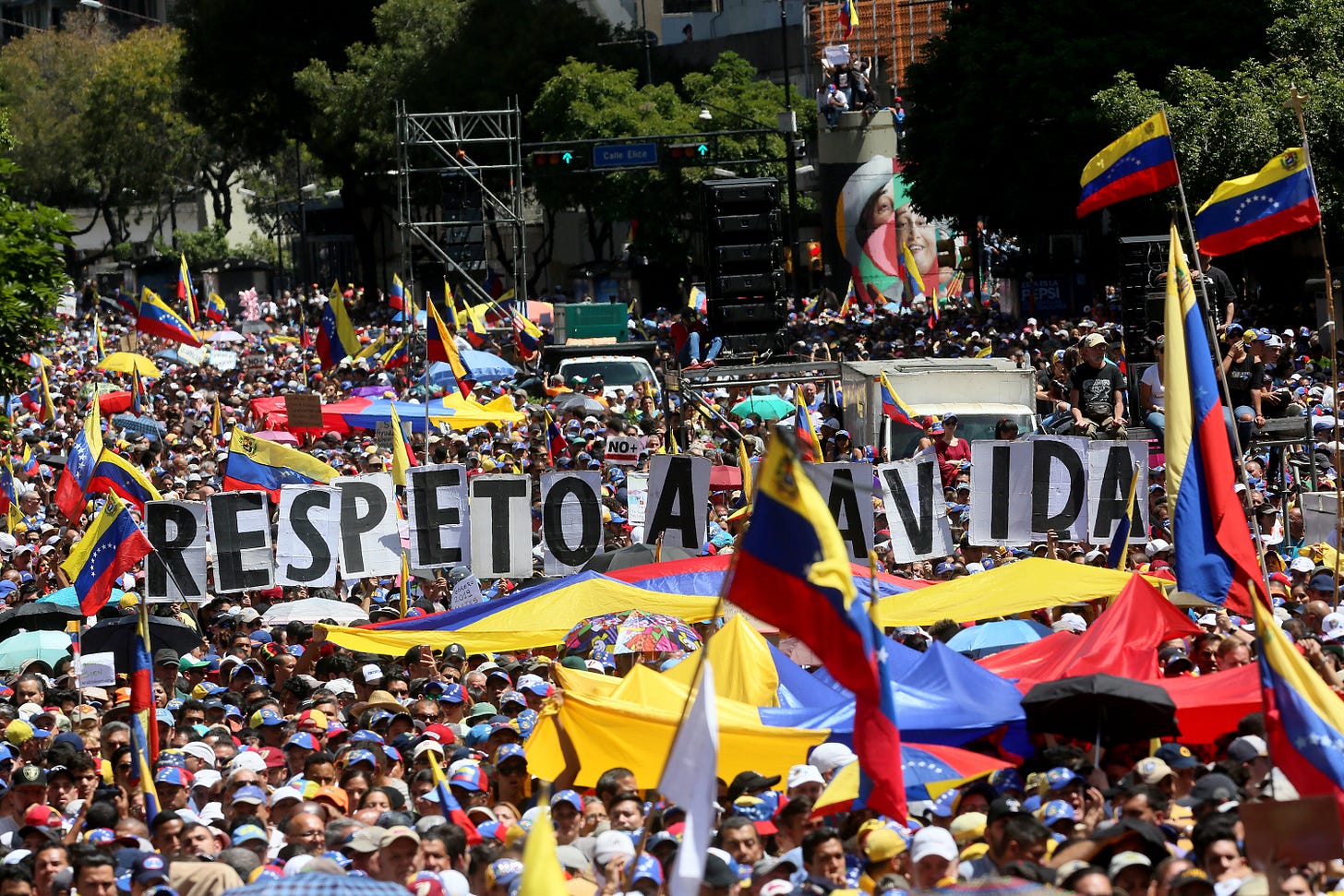How Ilhan Omar Slandered Venezuela’s Opposition
In targeting Elliott Abrams, she impugned the people who’ve been victims of the Maduro regime.

Rep. Ilhan Omar’s contentious back-and-forth with Elliott Abrams, the Trump administration’s special representative for Venezuela, has attracted no shortage of scrutiny, and for good reason. She began her questions with an attack on his honesty, and when he tried to respond, she refused to let him speak and then thanked him for his “participation.” She asked him if he approved of a massacre in Nicaragua in the 1980s, and when he answered “No,” she responded, “I’ll take that as a yes.” But her worst feat of factual legerdemain didn’t involve Abrams at all, but the Venezuelan opposition.
Here’s the transcript:
Omar: “Yes or no: Would you support an armed faction within Venezuela that engages in war crimes, crimes against humanity, or genocide if you believed they were serving U.S. interests as you did in Guatemala, El Salvador, and Nicaragua?”
Did you catch that? Nestled comfortably in the question is an oblique accusation against the Venezuelan opposition.
The Venezuelan opposition does not engage in war crimes, crimes against humanity, genocide, or other atrocities. The opposition largely consists of the democratically elected National Assembly and millions of Venezuelans who have turned out in protests against the Madruo government.
It’s possible to imagine that, in a failed state like Venezuela, armed bands could one day prey on innocents while in opposition to the government. But Omar’s question makes such a scenario sound like an inevitability rather than a figment of her staff’s imagination.
That’s not to say the struggle in Venezuela has been entirely peaceful. In January, the military, still loyal to Maduro, suppressed a national guard unit that had defected to the opposition. As for those protesting the regime, most of their violence has so far been directed against property – including a statue of Hugo Chavez – and in clashes with police, in which the resistance may have used firearms and a grenade launcher against police.
That’s a long way from the genocidal death squads Omar described. The Bulwark asked her office which groups or events, if any, she was referring to in her question. Her spokesman did not reply to a request for comment.
Perhaps Omar was confusing the opposition with the Maduro regime itself. According to Amnesty International, the Maduro regime has conducted more than 8,200 extrajudicial executions since 2015. The Washington Post details the actions of one elite police unit:
Dozens have been murdered in recent weeks alone for protesting against Maduro. Most of the killings have been committed by a police unit, a death-squad called the Special Actions Force, or FAES, notorious for its ski masks and extreme violence.
For years, the regime had pitched the unit as a gruesome kind of crime-fighting policy — a quick-and-dirty death penalty with cops playing the role of judge, jury and executioner.This resulted in more than 8,200 extrajudicial executions between 2015 and June 2017, according to Amnesty International.
This year, as anti-regime protests have spread, the FAES death squads have turned nakedly political, with the same units that cut their teeth killing suspected criminals with impunity turning on people suspected of holding political protests against the regime. The total death toll from the protests themselves reportedly includes 20 people or more, according to the United Nations. Given the regime’s policy that “killing people in the context of security operations is a successful practice,” most or all of those deaths are likely to be at the hands of the regime, not the protesters. Ultimately, the facts may be unknowable: Security services have been accused to staging executions to look like firefights. They’ve claimed more than 500 victims since 2014, per statistics from the UN Human Rights Office.
Casualty estimates are likely to rise as protests continue, especially if more elements of the security services defect to the opposition.
So far, American contributions to the Venezuelan crisis have consisted of plane-fulls of humanitarian aid dumped in neighboring Colombia. Maduro has vowed to prevent the aid from reaching Venezuelans.
But Omar’s words will reach them. Millions of people, who have seen their country slide from democracy into autocracy, from wealth to poverty, from peace to lawlessness, from freedom to oppression, will see a representative of the United States of America ignore the crimes of the Maduro regime in favor of speculating about imaginary death squads..
Under a pretense of defending human rights, Omar insulted and defamed its victims.
Abrams told Omar, “The entire thrust of the American policy in Venezuela is to support the Venezuelan people’s effort to restore democracy to their country. That’s our policy.” Someone ought to ask Omar what her policy is.


